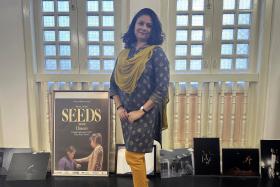Look to Dublin to turn S'pore into arts hub
Just as Irish government prioritised turning Ireland into a business hub, S'pore needs to invest in encouraging creatives
There is a vending machine full of books wrapped in paper with different designs on the front.
Some have sushi, others have Japanese rice balls and all of them have the word "Mystery Book" on the cover, with different four digit numbers - for example, #6291 or #3813 - written somewhere. Mystery books cost $19 each.
The vending machine was my first introduction to Tiong Bahru bookstore, BooksActually.
I was expecting to find a small store with a handful of obscure books written by a random smattering of people I may or may not know of.
But what I found was a world full of light, intricate maps, tote bags, cats and, of course, books. Books I knew, books I had heard of, and books written by Singaporean writers, such as Ann Ang, that I did not know existed.
"Does Singapore have any notable writers of its own?" I asked a friend, a rising artist in the Singaporean music scene.
She played with her piece of cake and said: "Yeah, I have read a couple but not enough to know who is who. Those I have read seem to cover a lot of the same themes and try to prove the same points about what Singaporean writing is or can be."
"I had never heard of any before visiting BooksActually," I said. "Maybe they are good but just stuck here."
"Your music is amazing," I told her. "Good enough to break beyond the confines of this 719 sq km city-state."
"You think so?" she asked.
"I do," I said.
After spending more time in Singapore, I met a handful of musicians and other creatives.
Aside from being incredibly talented, they all had the sense of "I need to get out of here to fulfil my potential", which caused me to ask the question: Is Singapore too small for them and their creative aspirations?
A few years ago, the company I worked at considered opening up a new office. Dublin was a possibility. I never imagined opening an office there, so I undertook the task of figuring out why any rapidly growing tech start-up would.
I learnt the tech scene in Dublin went back to the 1950s, when players like IBM set up offices there, laying the groundwork for others, such as Microsoft, to follow suit in the 1970s and 1980s.
This came about because the Irish government prioritised turning Dublin into an international hub of business.
In 1949, IDA Ireland, a governmental agency, was established with the goal of stimulating enterprise in Ireland.
Through ways such as promoting foreign investment, it has done just that. In 2013, Ireland was named Best Country for Business by Forbes.
What can we learn from that?
Heavy governmental investment will encourage creative Singaporeans to stick around as well as attract talent. With a reported $25 million being invested in traditional arts and other grants to artists via the National Arts Council, the city is taking steps in the right direction.
But it has a long way to go before it can be considered a hub for creatives. For it to be a hub, when people think of Singapore, they need to think of art.
So is Singapore too small for creatives and their aspirations?
I do not know. I do know if the yearning in artists to leave is replaced with a desire to stay, there is no doubt that one day, someone like me will grow up reading books by Singaporean writers, listening to music by Singaporean musicians and more.
Mateo is a New York-based writer who has done everything from working at an orphanage in Nairobi to building a new university in Abu Dhabi to sleeping on volcanos in Guatemala. He is working to get his novel published. To keep up with him, follow him on Instagram & Twitter at @AskMateo or send an e-mail to mateo@swagpapi.com
Get The New Paper on your phone with the free TNP app. Download from the Apple App Store or Google Play Store now

